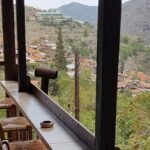A Historical Overview of Pedoulas Village
Pedoulas Village, nestled in the picturesque Troodos Mountains of Cyprus, boasts a rich and varied history that spans several centuries. Its origins can be traced back to the Byzantine era, when it first emerged as a small settlement. During this time, the village served as a refuge for people fleeing from Arab raids on the coast, providing a safe haven due to its mountainous terrain.
The influence of the Byzantine period remains evident in Pedoulas, most notably through the Church of Archangel Michael, a UNESCO World Heritage site. Built in the 15th century, this church is renowned for its exquisite frescoes that depict various religious scenes, offering visitors a glimpse into the village’s spiritual and artistic heritage.
As history unfolded, the village came under the rule of the Ottoman Empire in the late 16th century. This era introduced new cultural and architectural elements to Pedoulas, blending with the existing Byzantine influences. The Ottomans’ impact is still visible today in the form of traditional houses and other architectural remnants scattered throughout the village.
In modern times, Pedoulas has continued to evolve while preserving its historical essence. The village played a modest role during the British colonial period, contributing to the region’s overall development. Today, it stands as a testament to the harmonious coexistence of its historical periods, offering a unique journey through time for its visitors.
For history enthusiasts, Pedoulas Village is a treasure trove of cultural and historical landmarks. The Byzantine Museum, located in the village, houses a remarkable collection of religious artifacts and icons, providing deeper insights into the region’s past. Additionally, the Folkloric Museum showcases traditional Cypriot life, featuring exhibits that highlight the daily lives and customs of the village’s inhabitants over the centuries.
Pedoulas Village, with its rich tapestry of historical influences, remains a vital destination for those seeking to explore the cultural and historical heritage of Cyprus. Its well-preserved landmarks and museums offer a compelling narrative of the village’s journey through time, making it a hidden gem worth discovering.
Discovering the Attractions and Activities in Pedoulas Village
Pedoulas Village, nestled in the heart of the Troodos Mountains, offers a plethora of attractions and activities that captivate every visitor. One of the most prominent landmarks in the village is the Church of Archangel Michael. This 15th-century church is a UNESCO World Heritage site renowned for its stunning frescoes, which vividly depict biblical scenes and embody the rich Byzantine art tradition. The church’s historical and artistic significance makes it a must-visit for anyone exploring Pedoulas.
Beyond religious landmarks, Pedoulas is home to several intriguing museums. The Byzantine Museum, for instance, showcases a remarkable collection of icons, manuscripts, and ecclesiastical artifacts that provide insights into the local religious heritage. Meanwhile, the Folklore Museum offers a glimpse into the traditional Cypriot lifestyle, with exhibits featuring household items, traditional costumes, and tools used in everyday life.
The village’s traditional architecture is another point of interest. Walking through the narrow, cobblestone streets, visitors can admire the charming stone houses with their distinctive red-tiled roofs. These structures, often adorned with colorful flowers, create a picturesque setting that reflects the village’s timeless charm.
For nature enthusiasts, Pedoulas Village offers numerous outdoor activities. The Troodos Mountains boast an extensive network of hiking trails that cater to all levels of hikers. These trails provide breathtaking views of the surrounding valleys and forests, making every trek a memorable experience. Bird watchers will also find the area rewarding, as the diverse habitats support a wide range of bird species, including some endemics.
Local festivals and markets add to the vibrant cultural tapestry of Pedoulas. The village hosts various events throughout the year, such as the cherry festival in June, which celebrates the local cherry harvest with music, dance, and culinary delights. Visitors can also explore the weekly markets, where they can purchase artisanal products and taste traditional Cypriot dishes, such as souvlaki and halloumi.
Pedoulas Village, with its rich history, cultural heritage, and natural beauty, offers a diverse array of attractions and activities. Whether exploring historic landmarks, engaging in outdoor adventures, or immersing in local festivities, visitors are sure to find an experience that resonates with them in this hidden gem of Cyprus.






